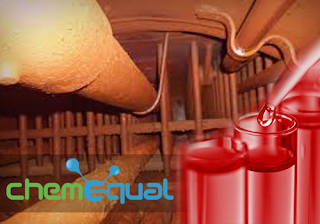Rodine 213
has remained the most popular choice till date for Hydrochloric Acid pickling and
plant cleaning.
Hydrochloric acid replaced Sulfuric acid as
the pickling liquor since it pickles substantially faster with minimal base
metal loss. The highly reactive chloride ion in the acid is the reason for high
efficacy in the cleaning procedure. It is utilized for cleaning metals with
alloy content of 6% or less. An acid inhibitor must be added to the pickling solution
to keep the metal surface from dissolving or getting pitted. Such pickling acid
inhibited liquor is called "Inhibited HCL" and is a mix of
Hydrochloric acid solution in water (3% to 10%) and an acid corrosion inhibitor
which in itself is a mix of natural and synthetic chemicals that adsorb on the
metal surface during pickling.
Rodine 213 is a
superior synthetic blend of keto-amine complex substitutes with non-ionic
surfactants, alcohols and solvents particularly intended to restrain
hydrochloric acid corrosion on metal surfaces during modern operations like surface
cleaning and pickling. It is effective over an extensive variety of metal
surfaces like Iron and Steel, copper and metal. Rodine 213 is a high foaming anti-corrosion
additive with a high viability at dispersing oil and grease and is perfect for
HCL based pickling liquor systems particularly before plating.
It guarantees metal surface protection during
procedures including lime scale removal from kettle and pipework and from evaporating
plants, removal of oxide residue from iron, steel, metal and copper. Rodine 213
is free from chlorinated hydrocarbons and heavy metals like arsenic and lead.
It can be synergized with Hydrochloric acid pickling in stipulated dozes both
by circulation method and by drench and flush operations. Rodine 213's exceptional
quality and thermal stability makes it a perfect acid corrosion inhibitor for
improvement of the pickling procedure by pre-warming the liquor bath with the inhibited
acid system. It additionally works as an excellent acid fume suppressant.
Its key
components can be summarized as follows:
• Modifies metal surface to prevent
corrosion
• Easy to apply
• Excellent wetting properties for
better cleaning
• Effective acid fume suppression
• Saves Zinc during Plating
• Reduces metal loss
• Enhances quality of pickling acid bath,
and decreases acid consumption
Rodine 213
has boundless modern applications in enterprises like Iron and Steel, Power
Station, Heavy Engineering Industries, Petrochemical and Refineries, Sugar
Processing Industry, Cement, Glass and Ceramic Industries to name a few.



